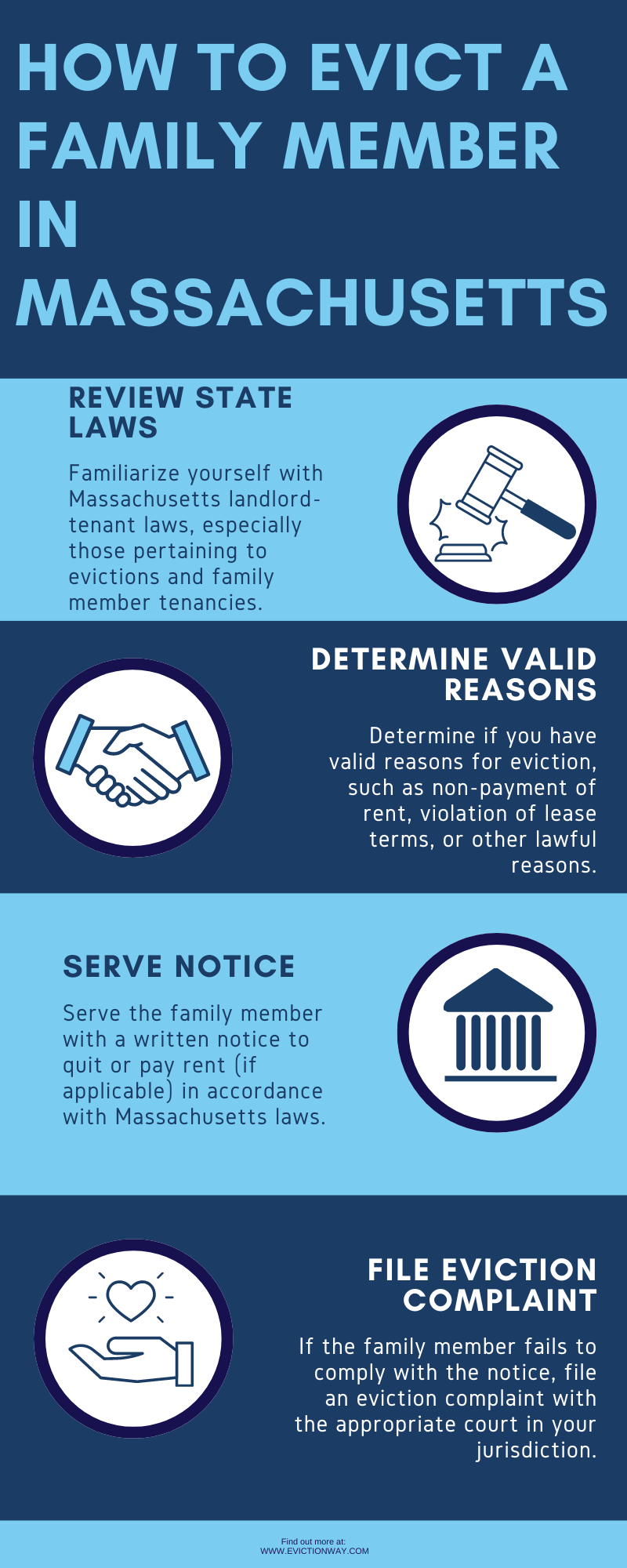Evicting a family member can be a difficult and emotional process, but it may be necessary to protect your rights and property. In Massachusetts, there are specific laws and procedures that must be followed when evicting a family member. This blog article will provide you with the information you need to know about how to evict a family member in Massachusetts.
We will share the best way to evict a family member in Massachusetts, and we will tell you the method to evict them. We will also share tips on removing a family member politely, the laws involved, and legal tips.

If you are considering evicting a family member, it is important to seek legal advice. An attorney can help you understand your rights and options, and can guide you through the eviction process.
How To Evict a Family Member In Massachusetts
Evicting a family member can be a difficult and emotional process, but it is sometimes necessary to protect your rights and property. If you are considering evicting a family member in Massachusetts, it is important to understand the legal process and your rights as a landlord.
1. Give Proper Notice
The first step in evicting a family member is to give them proper notice. In Massachusetts, you must give your tenant at least 14 days’ written notice to vacate the property. The notice must state the reason for the eviction and the date by which the tenant must vacate.
2. File a Complaint with the Court
If your tenant does not vacate the property after receiving the notice, you will need to file a complaint with the court. The complaint should state the facts of the case and the relief you are seeking, such as an order of eviction.
3. Serve the Complaint on Your Tenant
Once you have filed the complaint, you will need to serve it on your tenant. This can be done by having a sheriff or constable deliver the complaint to your tenant in person.
4. Attend the Court Hearing
After the complaint has been served, a court hearing will be scheduled. At the hearing, you will have the opportunity to present your case to the judge. Your tenant will also have the opportunity to present their case.
5. Obtain an Order of Eviction
If the judge rules in your favor, they will issue an order of eviction. This order will give your tenant a specific amount of time to vacate the property. If your tenant does not vacate the property by the deadline, you can have the sheriff or constable remove them from the property.

6. Seek Legal Help
Evicting a family member can be a complex and challenging process. It is important to seek legal help from an experienced attorney to ensure that your rights are protected.
Additional Resources for Massachusetts eviction help:
Eviction notice Massachusetts
In Massachusetts, notice to quit for non-payment of rent is a document used by landlords to inform tenants they’ve missed rent. This notice essentially notifies tenants that they receive the notice to do one of two things:
- Pay the rent in full
- Vacate the property
If the tenant doesn’t comply, the landlord can then proceed with filing an eviction lawsuit in court.
You can download eviction notice Massachusetts here.
How Much Does it Cost to Evict a Family Member in Massachusetts?
Evicting a family member can be a difficult and expensive process. The cost of eviction will vary depending on the specific circumstances of the case, but there are some general costs that you can expect to incur.
| Action | Approximate Cost |
|---|---|
| Filing fee | $135 |
| Summons and Complaint form | $5 |
| Issuance of required summons | $5 |
| Additional surcharge | $15 |
| Service of court summons by sheriff | $20 |
| Enforcement of writ of execution | Varies by county |
| Legal fees | $500-$10,000 |
| Average locksmith fees | $160 |
- Filing fees: The first step in the eviction process is to file a complaint with the court. The filing fee for an eviction complaint in Massachusetts is $135.
- Service of process: Once the complaint has been filed, it must be served on the tenant. The cost of service of process will vary depending on the method of service.
- Attorney fees: If you hire an attorney to represent you in the eviction process, you will be responsible for their fees. Attorney fees can vary widely, so it is important to get a quote from an attorney before hiring them.
- Court costs: If the case goes to trial, you will be responsible for court costs. Court costs can include the cost of the jury, the bailiff, and the court reporter.

FAQs: Evicting a Family Member in Massachusetts
Here are some of the most frequently asked questions about evicting a family member in Massachusetts:
What are the grounds for evicting a family member in Massachusetts?
In Massachusetts, you can evict a family member if they have violated the terms of their tenancy, such as by not paying rent or damaging the property. You can also evict a family member if they are causing a nuisance, such as by being disruptive or threatening.
How do I start the eviction process?
To start the eviction process, you must give your family member a written notice to quit. This notice must state the reason for the eviction and the date by which your family member must vacate the property. If your family member does not vacate the property by the deadline, you can file a complaint with the court.

What are the steps involved in the eviction process?
The eviction process in Massachusetts typically involves the following steps:
- Serving your family member with a notice to quit
- Filing a complaint with the court
- Attending a hearing
- Obtaining a judgment from the court
- Enforcing the judgment
How long does the eviction process take?
The eviction process in Massachusetts can take several months, depending on the circumstances of the case. If your family member contests the eviction, the process may take even longer.
What are my rights as a landlord?
As a landlord, you have the right to evict a family member who has violated the terms of their tenancy or who is causing a nuisance. You also have the right to be represented by an attorney throughout the eviction process.
Related:
